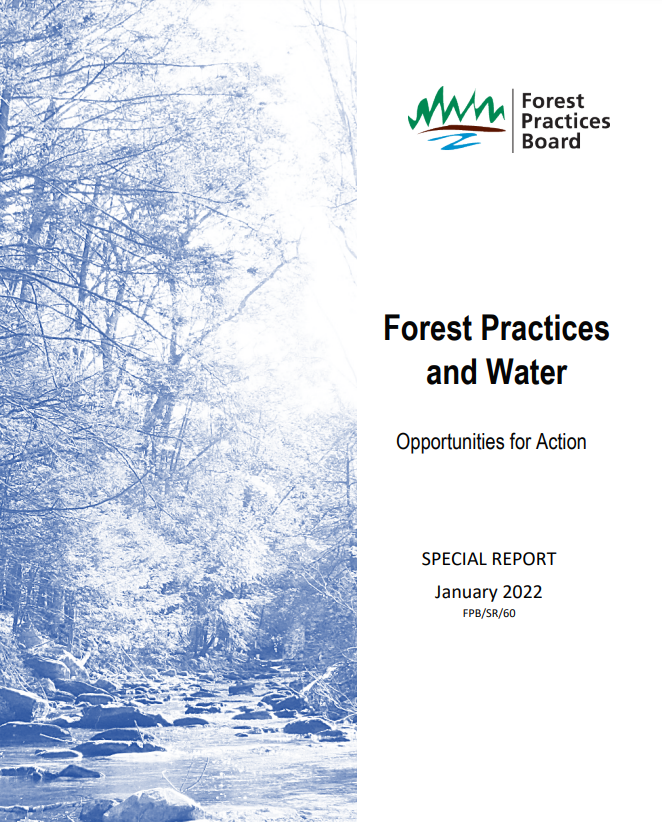Article /
Forest Practices and Water: Opportunities for Action Special Report (2022)

Executive Summary
Properly functioning watersheds support values that are important to the public and Indigenous Peoples throughout British Columbia, and can be more resilient to the effects of a changing climate.
Water is a recurring theme in the work of the Forest Practices Board (the Board) because forest and range practices have the potential to affect water quality, quantity, and the timing of flow, which can have negative impacts on values such as drinking water quality, aquatic ecosystems and habitat, public infrastructure and private property.
Since 2006, the Board has investigated 27 complaints, published 8 special investigations and reports that involved forest management and water under the Forest and Range Practices Act (FRPA), and completed three compliance audits with findings related to water. While FRPA is the primary legislation protecting water from damage by forest and range practices, there are other related laws with the potential to influence practices under FRPA. The Board believes that BC needs to clarify and improve how existing laws can work together to protect water and downstream values.
Forest licensees in BC generally demonstrate a high degree of compliance with FRPA’s legal requirements relating to water, and some licensees voluntarily go beyond the legal requirements; however issues still arise. Too often, practices focus on a single activity at the stand level while many impacts on water involve the combined effects of all activities over time and need to be managed at a watershed level.
The Board prepared this special report as advice to government relevant to three current initiatives—the creation of a Watershed Security Strategy and Fund, modernization of BC’s forestry legislation, and development of a Climate Preparedness and Adaptation Strategy.
Through our work, we have identified four significant issues with the management of forest practices and their effects on water:
1. The public does not have adequate opportunity for meaningful involvement in how forest practices occur in relation to water and risk to values.
2. There are no legal requirements to assess or consider cumulative effects of forest practices in most watersheds in BC.
3. Current forest practices contribute sediment into streams.
4. Historical forest practices continue to negatively affect water.
The Board is of the view that BC could address these issues by acting on the following four opportunities:
1. Improve public involvement by making water a core value in forest planning, including forest landscape planning.
2. Manage cumulative effects of forest practices on water as a legal requirement in all watersheds.
3. Improve regulation of forest practices that contribute sediment to streams.
4. Reduce the impact of historical practices on water through a renewed program of watershed restoration.
Citation: Forest Practices Board. (2022). Forest Practices and Water: Opportunities for Action Special Report.
- Access Management and Resource Roads: 2015 Update
- A Decade in Review: Observations on Regulation of Forest and Range Practices in British Columbia
- Special Report: Conserving Fish Habitats under the Forest and Range Practices Act
